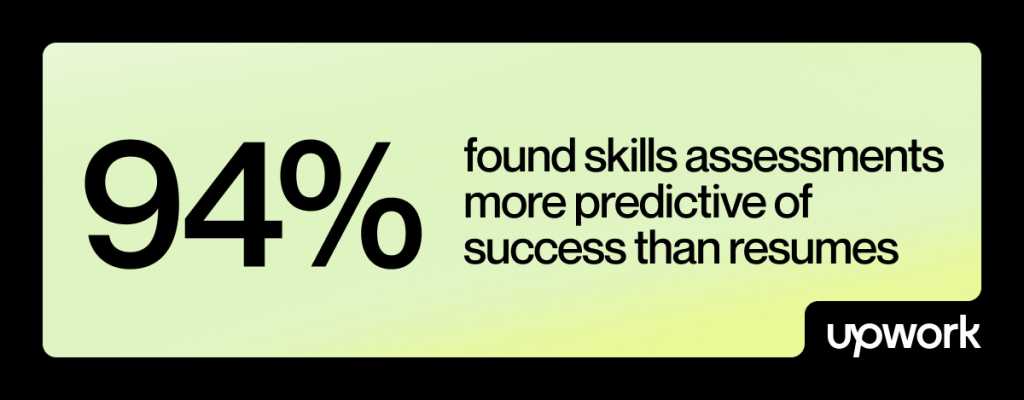
Do degrees still matter?
For decades, a college degree was the ticket into the professional world. Employers used it as an indication of intelligence, persistence, and competence. But that assumption no longer works. Skills — not schools — are becoming the new hiring currency in modern workplaces, including those leaning into AI, reports Upwork, an online marketplace for hiring skilled freelancers.
Why degrees aren’t as important to employers anymore
Employers are moving away from relying on degrees as the primary signal of potential. Instead of asking, “Where did you study?” they’re asking, “What can you do?”
A survey from The Upwork Research Institute shows this shift is well underway. Out of 1,250 C-suite respondents, 81% said their organizations are adopting skills-based hiring practices. This includes removing degree requirements from job postings, using skills assessments, and recruiting from nontraditional sources like military-to-civilian programs, coding bootcamps, and freelancer platforms.

Four major forces are driving the move toward skills-first hiring:
- The speed of change. The World Economic Forum projects that 39% of worker skills will be transformed or outdated within five years. Degrees take years to complete and can quickly become inadequate, leaving workers unprepared for today’s needs.
- More learning options. Compared to traditional degrees, online courses, bootcamps, and micro-credentials make it easier, cheaper, and faster to gain in-demand skills.
- Talent shortages. Sectors like health care, technology, and marketing face serious skills gaps. Restricting roles to degree-holders narrows the pool, while skills-first hiring opens it up.
- Rise of skilled freelancers. Freelancers are hired based on proven results, not credentials. In fact, 76% of executives say freelancers add more value than employees with degrees.

Together, these forces are reshaping what “qualified” really means. Degrees still matter in some fields, but in a growing number of roles, continuous learning and applied experience matter more.
The benefits of dropping degree requirements
Shifting to skills-first hiring could give you a competitive advantage. Businesses that prioritize skills see:
- Wider talent pools. Dropping degree requirements brings in previously overlooked professionals with valuable expertise.
- Stronger performance. Freelance knowledge workers outpace skilled employees in several key metrics including AI proficiency, expertise in fast-growing areas, and continuous learning.
- Greater agility. Organizations adapt faster by pulling in specific skills when needed instead of hiring for roles.
- Sharper hiring accuracy. A Test Gorilla survey shows 90% of companies using skills-first methods reduced mis-hires, while 94% found skills assessments more predictive of on-the-job success than resumes.
- Broader diversity and inclusion. Removing degree barriers creates more inclusive teams that better reflect today’s workforce.

How employers can adopt skills-first hiring
If degrees disappeared from resumes tomorrow, could your company still identify and hire the best talent? Making the shift doesn’t happen overnight, but you can start with these practical steps:
- Audit your workforce. Many executives lack a full understanding of their employees’ skills. Mapping strengths and gaps helps guide strategic hiring.
- Rewrite job descriptions. Remove degree requirements unless truly essential. Focus on core skills and outcomes instead.
- Update evaluation methods. Move beyond resumes. Use project-based interviews, portfolio reviews, and skills tests.
- Invest in learning. Offer employees stipends, courses, and mentorships to support continuous skill growth.
- Create skills-based career paths. Reward growth in skills, not just tenure. This boosts employee engagement and retention.
- Tap new talent sources. Consider apprenticeships, bootcamps, and freelancer platforms to find skilled professionals outside of traditional pipelines.
Rethinking the role of degrees
Today’s workplace runs on skills, adaptability, and lifelong learning. Degrees still matter in fields that require deep foundational training, but they’re no longer the universal key to success. Skills-first hiring opens doors, reduces mis-hires, and helps organizations stay agile.
This story was produced by Upwork and reviewed and distributed by Stacker.



